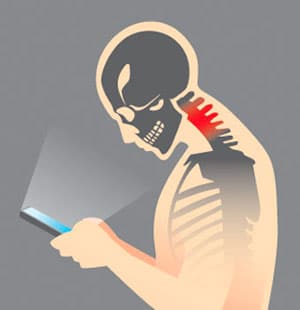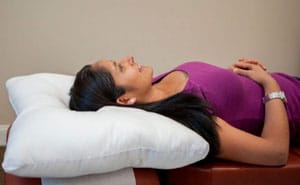Those affected by a pinched nerve in the neck seem to be increasing every year. Technology plays a big role in this as we’re on our cell phones and computers throughout the day.
Most people aren’t even aware they have a pinched nerve in their neck and instead attribute it to simply having a kink in the neck from a poor night’s sleep. Oftentimes, the neck pain even extends into your arms and even hands.
Fortunately, there are many treatment options with a high success rate.
What is a Pinched Nerve?
A simple definition of a pinched nerve from the Mayo Clinic is a nerve that has too much pressure on it from the surrounding bones and/or body tissue. If that nerve receives too much external pressure, it may actually lose its ability to transmit the signals that it normally gives out to the body. As a matter of fact, the pressure may even cause the nerve to send out a false pain signal.
 Causes of a Pinched Nerve in the Neck
Causes of a Pinched Nerve in the Neck
A pinched nerve can be the result of any number of activities that we take part in as a regular course of our day. It can be caused from too much sitting, typing, or cell phone use, heavy lifting, or any number of other things that are nothing but routine.
The first sign that you have a pinched nerve in the neck is that pain is centralized in that area of your body. A lot of people complain of a pinched nerve in the lower back or a pinched nerve in the shoulder blade, but the pain can actually occur anywhere on the body.
Symptoms of a Pinched Nerve
The news for someone with a pinched nerve is not really all that great. They have to deal with the fact that they will likely experience some of the following symptoms as described by the Laser Spine Institute:
- Numbness
- Weakness of the muscles in the area
- General pain
- Burning
- Tingling sensation
Any combination of these symptoms are possible. In fact, some have reported feeling these symptoms in areas of their body that are not directly related to the neck area.
It seems possible that the nerves can transmit false signals throughout the body almost anywhere. In case of the neck, pain will often radiate down your arms and even into your hands and fingers.
Home Treatment Options
You have some options for treating a pinched nerve that can include some home remedies if that’s the route you decide to take. Some claim that home treatment works just as well for them as any kind of treatment that they receive anywhere else. It’s worth a shot at least to see what may work well for you and your circumstances.
 Resting Your Neck
Resting Your Neck
Your poor neck has the responsibility of holding up your head all day and turning your head when called upon as well. It has to do a lot of work all the time, and it is possible that it just becomes worn out after some time.
It’s a good idea to give it a rest once in a while to try to regroup and recovery from the pinched nerve in your neck. Laying it on a cervical pillow that is specifically designed for this type of treatment is often a good place to start for a lot of people.
Neck Traction Devices
For severe pinched nerves, a cervical neck traction device is a great option. There are many different types available. The purpose of all is to create additional space between (decompress) the vertebrae in your neck since that is often the case with pinched nerves.
These devices have been used by doctors and physical therapists for years and you can now use them in the comfort of your own home.
Neck Exercises
Gently rolling your neck back and forth to try to help stretch it out can bring some relief to those with a pinched nerve in that area. Obviously, stop any motion in your neck that hurts when you do it. At the same time, you should try to see if any of those stretches help to start to bring some relief to your aching neck. You might actually be able to get away from always being in pain by simply stretching it out some on a consistent basis.
Heat or Ice
It’s your choice as to if you would like to apply heat or ice to the affected area. Heat is known to relax muscles around the pinched nerve and potentially bring relief to those who are suffering. Ice is obviously something that a person uses when they are wanting to numb the pain that they are going through. Either option can be a good one if you are trying to find an at-home solution to your problem.
If Home Treatment Fails
You may discover that at-home treatments do not bring you any relief to your pinched nerve situation, or at least not the level of relief that you require. If this is the case, you might want to consider setting up an appointment with a chiropractor. This is a trained professional who helps treat people with all kinds of ailments from pinched nerves to back or neck injuries.
The role of a chiropractor is to try to relieve pain through a use of various techniques such as spinal adjustments and massage. They seek to treat the central nervous system of our bodies, and in doing so hopefully provide us with some relief from the pain that we experience as a result of our pinched nerve.
They are a good resource to have because of their wealth of knowledge on these topics. Some are better than others so ask friends and relatives for recommendations. They have worked with many patients with pinched nerves in the past, so you can count on their judgement to know what to do with your situation.
It is likely that you will need to make more than one visit to the chiropractor before their treatment begins to show an effect. At the same time, the chiropractor can give you some great tips to continue with your treatment when you get back to your home. They may have helpful suggestions that you cannot find anywhere else.
If that is the case, then you will want to listen to what they have to say so as to start feeling better as soon as is humanely possible. A pinched nerve is never something that you want to have to live with any longer than absolutely necessary.
Adam
Latest posts by Adam (see all)
- Running and Lower Back Pain (Before, During, and After Running) - July 1, 2019
- Benefits of Swimming Pool Exercises for Back Pain - March 20, 2019
- Care Options for Seniors With Back Pain - September 4, 2018


 Causes of a Pinched Nerve in the Neck
Causes of a Pinched Nerve in the Neck Resting Your Neck
Resting Your Neck